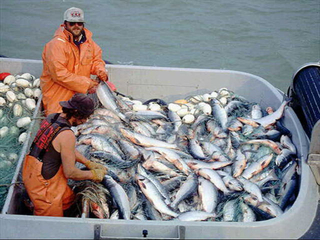Principal Sponsor: U.S. Rep. Robert Whitman, First Congressional District, Virginia
Status as of 9/1: Referred to Committee on Natural Resources
To amend the Magnuson-Stevens Fishery Conservation and Management Act to require the Secretary of Commerce to develop a plan to conduct stock assessments for all stocks of fish for which a fishery management plan is in effect under that Act and for other purposes.
Grade: A
Summary of the bill: H.R. 3063 is an amendment to the Magnuson-Stevens Fishery Conservation and Management Act aimed at improving the science behind stock assessments when a federal fishery management plan is in effect.
The Wittman Amendment would do this in five ways: (1) Define “Stock Assessment”; (2) Establish a stock assessment plan; (3) Collect data from non-governmental sources; (4) Reduce the costs of catch monitoring; and, (5) Identify recoverable costs.
H.R. 3063 in no way expands existing catch share programs to fisheries are not currently utilizing catch share management techniques.
Henceforth, under the Wittman Amendment, “Stock Assessment” would be specifically defined as an evaluation of the past, present, and future status of a stock of fish by taking into consideration a range of life history characteristics. Stock assessment would include geographical boundaries of the stock, information of the age, growth, natural mortality, sexual maturity and reproduction, feeding habits, and habitat preference of the stock as well as impacts from fishing of the stock.
H.R. 3063 would require a stock assessment plan to be published in the Federal Register, updated every five years or as is reasonable given the biology and characteristics of the stock. For fish stock that has not yet had an initial stock assessment, a schedule would be established and an initial assessment would be conducted within three years of the plan being published in the Federal Register.
The most important piece of the Wittman Amendment is the language requiring the use of scientific data beyond that provided by government agencies in determining the stock assessments. To improve the science, H.R. 3063 would broaden the sources of scientific data to include non-governmental sources: fishermen, fishing communities, universities, and research institutions, especially as it pertains to recreational fishermen.
Standards for data collection and use, including the establishment of a registry of sources will reduce uncertainty and increase accuracy of fish stock assessments. Regional Fishing Councils will then have the best scientific data to make fishery management decisions.
One year after the passage of H.R. 3063, regional fishery councils will submit a report to Congress outlining the most effective means of enforcing their management goals, with specific attention being paid to methods used to accomplish these goals including: human observers, electronic monitoring, and vessel monitoring systems. The report will also require an assessment of the cost effectiveness of each enforcement strategy. No fee can be collected unless a report is issued explaining which costs will be recovered by the fee and which costs will not be recovered by the fee.
